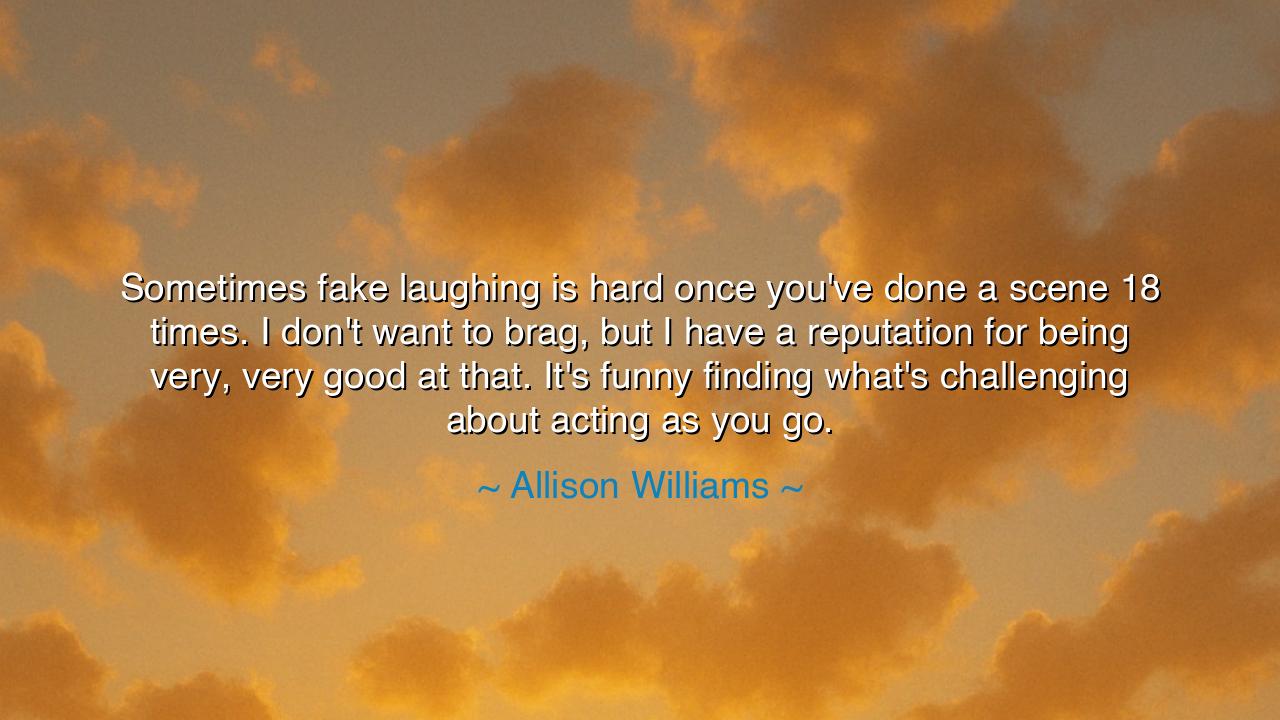
Sometimes fake laughing is hard once you've done a scene 18
Sometimes fake laughing is hard once you've done a scene 18 times. I don't want to brag, but I have a reputation for being very, very good at that. It's funny finding what's challenging about acting as you go.






“Sometimes fake laughing is hard once you've done a scene 18 times. I don't want to brag, but I have a reputation for being very, very good at that. It's funny finding what's challenging about acting as you go.” — so spoke Allison Williams, the actress whose craft bridges the quiet discipline of performance and the luminous illusion of storytelling. Her words, though playful, conceal a truth that the ancients would have recognized as the paradox of art and authenticity — that the artist must feel deeply while also mastering the art of pretending. In her laughter — both real and rehearsed — lies the eternal question of all creators: how to remain sincere when the work demands repetition, and how to keep the flame of truth alive in the shadow of performance.
When Williams says, “Fake laughing is hard once you've done a scene 18 times,” she speaks not only of acting, but of the deeper fatigue that comes from recreating genuine emotion again and again. To laugh on command is not merely to move the face; it is to summon a spirit. The ancients understood this in the theater of Athens, where actors wore masks not to hide, but to channel something larger than themselves — the living essence of joy, sorrow, and tragedy. To repeat a laugh for the eighteenth time is to face the same challenge they did: to make illusion feel real, even when one’s own heart is tired. This is the burden of the performer — to breathe life into imitation until it glows with truth.
Her words also carry a quiet humor: “I don’t want to brag, but I have a reputation for being very, very good at that.” This self-mockery reveals the humility of the wise. For the greatest artists are not those who take themselves too seriously, but those who find lightness in their labor. The ancients revered the poet who could laugh at the absurdity of his own task — to paint eternity with mortal hands. Williams’ jest, though modern, bears that same spirit. It is the laughter of one who knows the irony of her art — that even the fake must be crafted with real effort, that even the smallest illusion demands sincerity.
In her final reflection — “It’s funny finding what’s challenging about acting as you go” — Williams touches on the journey of self-discovery that lies at the heart of all creative life. The ancients called this the path of mastery, the way by which one learns not only the craft, but also the self. Each performance, each repetition, reveals a new obstacle: boredom, fatigue, perfectionism, doubt. Yet these challenges are not curses — they are teachers. To endure them is to refine the spirit, to learn patience, resilience, and grace. For the actor, as for any seeker, true growth comes not from applause, but from perseverance through the unseen struggles.
Consider the tale of the Greek sculptor Pygmalion, who labored endlessly over his statue until it seemed alive. Though the marble never laughed, his devotion gave it the illusion of breath. The gods, moved by his sincerity, brought the statue to life. Williams’ “fake laughter” mirrors this myth: through repetition and craft, the false becomes real. What begins as mere performance, when done with heart, becomes truth itself. The lesson is not about deception — it is about transformation. The artist who persists in sincerity, even within illusion, calls forth life where there was none before.
Yet, beyond the art, Williams’ words also speak to the human condition. Who among us has not faked laughter to ease another’s heart, to smooth the moment, to keep the peace? Life itself is full of scenes we repeat — duties performed, smiles rehearsed, kindnesses extended even when we are weary. In these moments, too, the challenge is the same: to preserve the real within the routine, to remain genuine even in the act of pretending. The ancients would have called this the art of living well — to act our part in the play of life without forgetting who we truly are.
So let this teaching be passed down: The craft of sincerity is not in the absence of artifice, but in the presence of awareness. Whether you are an actor, a worker, a parent, or a dreamer, your task is to bring truth into repetition, to find meaning even in the practiced gesture. Laugh, even when it is the eighteenth time — but let your laughter still carry a spark of soul. Meet each challenge not with frustration, but with curiosity, for every repetition refines you. As Allison Williams reminds us, the work of becoming authentic does not end; it deepens. The fake laugh, when offered with care, becomes a bridge to something real — and that, perhaps, is the oldest and greatest art of all.






AAdministratorAdministrator
Welcome, honored guests. Please leave a comment, we will respond soon